外研版(2019)必修第二册Unit6 Earth first-Using language课件(14张PPT)
文档属性
| 名称 | 外研版(2019)必修第二册Unit6 Earth first-Using language课件(14张PPT) | 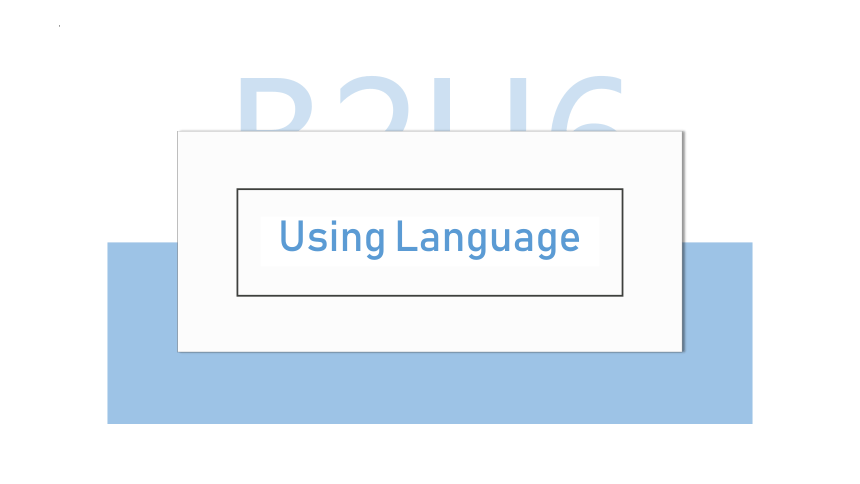 | |
| 格式 | zip | ||
| 文件大小 | 972.0KB | ||
| 资源类型 | 教案 | ||
| 版本资源 | 外研版(2019) | ||
| 科目 | 英语 | ||
| 更新时间 | 2022-04-15 17:03:25 | ||
图片预览

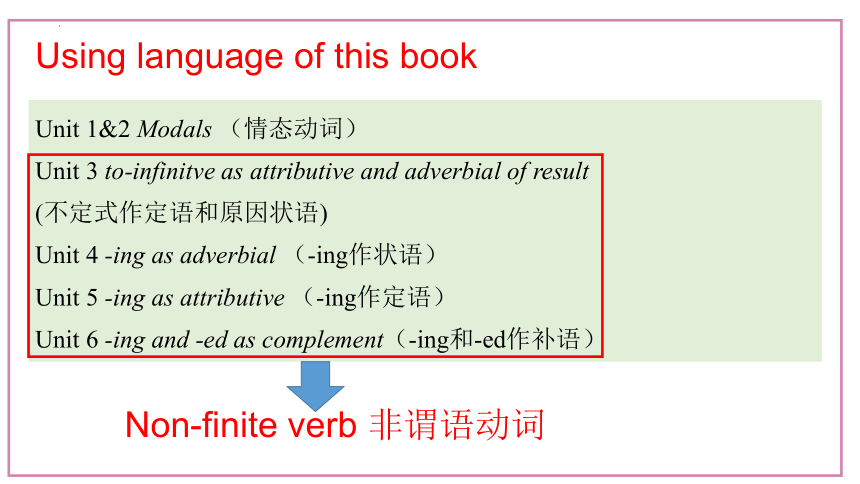
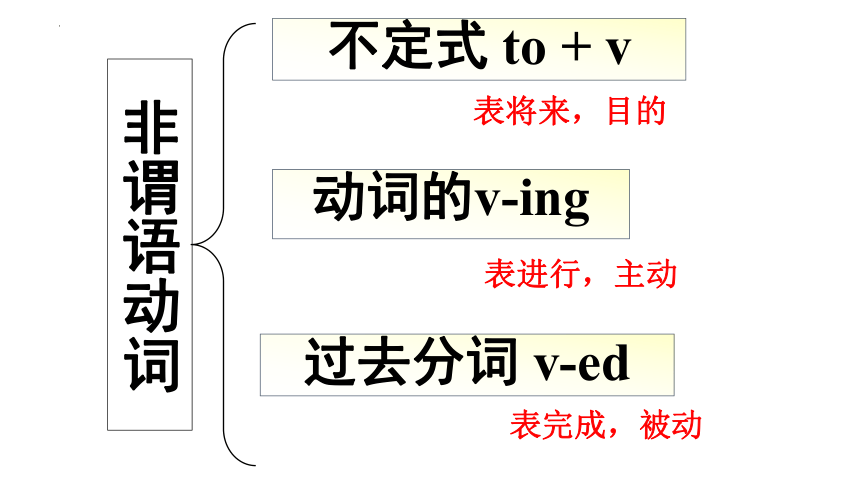

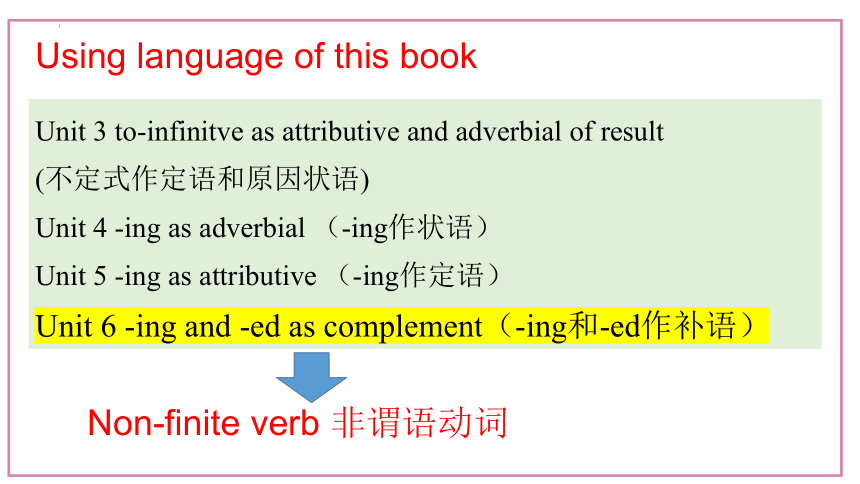
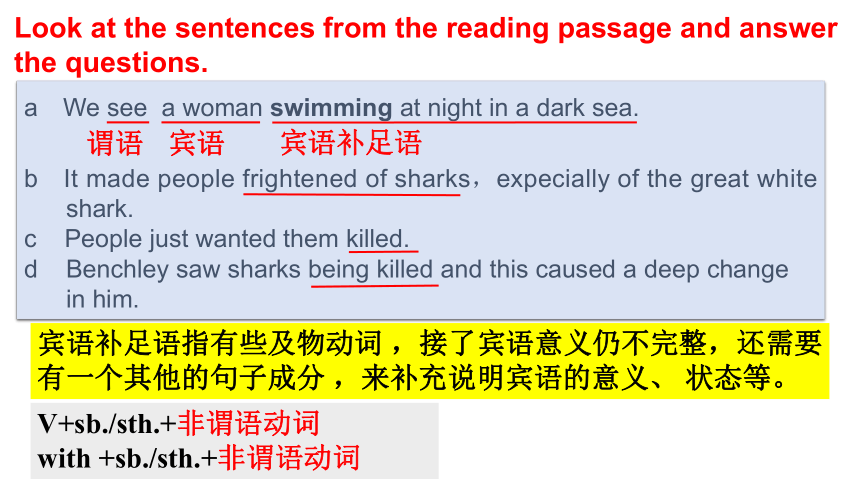
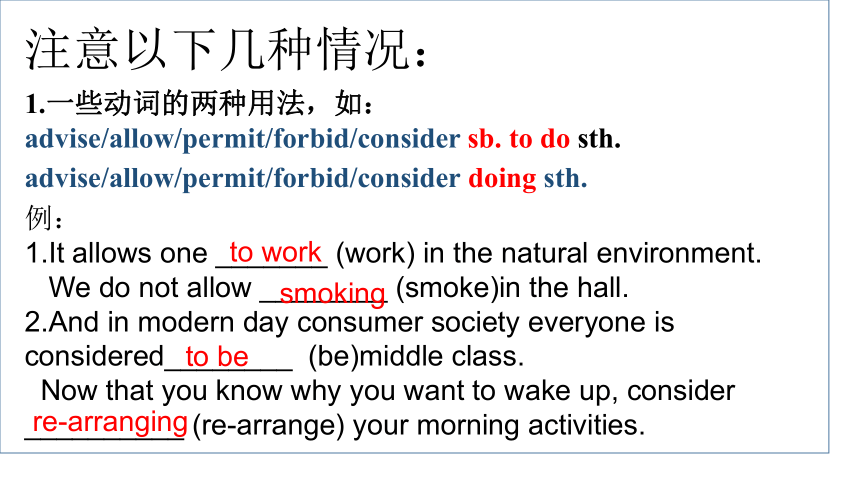
文档简介
(共14张PPT)
B2U6
Using Language
Unit 1&2 Modals (情态动词)
Unit 3 to-infinitve as attributive and adverbial of result
(不定式作定语和原因状语)
Unit 4 -ing as adverbial (-ing作状语)
Unit 5 -ing as attributive (-ing作定语)
Unit 6 -ing and -ed as complement(-ing和-ed作补语)
Using language of this book
Non-finite verb 非谓语动词
过去分词 v-ed
不定式 to + v
动词的v-ing
非谓语动词
表将来,目的
表进行,主动
表完成,被动
Practise
1). When _______(heat), water will be changed into vapour.
While _______ (heat) water, we can change it into vapour.
2) The question __________ (discuss) at the meeting yesterday is of quite importance.
The question _____________ (discuss) at the meeting now is of quite importance.
The question ______________ (discuss) at the meeting tomorrow is of quite importance.
heated
heating
discussed
being discussed
to be discussed
Unit 3 to-infinitve as attributive and adverbial of result
(不定式作定语和原因状语)
Unit 4 -ing as adverbial (-ing作状语)
Unit 5 -ing as attributive (-ing作定语)
Unit 6 -ing and -ed as complement(-ing和-ed作补语)
Using language of this book
Non-finite verb 非谓语动词
Unit 6 -ing and -ed as complement(-ing和-ed作补语)
Look at the sentences from the reading passage and answer the questions.
a We see a woman swimming at night in a dark sea.
b It made people frightened of sharks,expecially of the great white
shark.
c People just wanted them killed.
d Benchley saw sharks being killed and this caused a deep change
in him.
宾语补足语
宾语
谓语
宾语补足语指有些及物动词 ,接了宾语意义仍不完整,还需要有一个其他的句子成分 ,来补充说明宾语的意义、 状态等。
V+sb./sth.+非谓语动词
with +sb./sth.+非谓语动词
Can you persuade the manager to stop on
注意以下几种情况:
1.一些动词的两种用法,如:
advise/allow/permit/forbid/consider sb. to do sth.
例:
1.It allows one _______ (work) in the natural environment.
We do not allow ________ (smoke)in the hall.
2.And in modern day consumer society everyone is considered________ (be)middle class.
Now that you know why you want to wake up, consider __________ (re-arrange) your morning activities.
to work
smoking
to be
re-arranging
advise/allow/permit/forbid/consider doing sth.
2.感官动词 + sb/sth + 非谓语形式
感官动词:see, watch, observe,
look at, notice(五看)
hear, listen to(两听)
1.I saw her ________(paint) a picture just now.
2.I saw her ________(paint) a picture when I passed by her room.
3.I saw a picture ____________(paint) by her when I passed by her room.
4.I saw a picture ________(paint).
doing主动,正在进行
do主动,完成
done被动,完成
painting
being painted
painted
paint
being done被动,正在进行
make sb/sth
keep sb/sth
have sb/sth
get/leave sb/sth
let sb/sth
doing sth让...一直做...
done使...被...
do sth让...做...
done使...被...
do sth让...做...
done使...被...
doing sth让...一直做...
to do sth让...做...
done使...被...
doing sth使...开始做...
3.使役动词 + sb/sth + 非谓语形式
do sth让...做...
(1)When I was on my way to school this morning,I
saw two women ________(argue).
(2)Don’t keep the children (work) on
their lessons all day.
(3)On the bank of the river,we found him (lie)
on a bench,with his eyes (look) on a
kite in the sky.
(4)Let’s have all the windows (clean).
arguing
lying
working
looking
cleaned
Exercise
Read the passage and choose the correct form of the verbs.
Attracted/Attracting by mermaids since she was a child, Hannah Fraser created her first tail when she was only nine years old. Now, she is a model and performance artist devoted/ devoting to ocean conservation. She can be seen worn/wearing mermaid clothing and dived/ diving up to 50 feet underwater to swim with dolphins, sharks and whales. She appeared in The Cove,a documentary aiming at highlighting the cruelty of dolphin hunting. Besides performing and modelling, Hannah travels the world given/giving presentations and talks, getting more people involved/involving in the conservation of ocean life.
Rewrite the underlined sentences in the interview,using the -ing and -ed forms to make it more compact and coherent.
Reporter: Hello from Sanjiangyuan National Nature Reserve(SNNR). With me today is Lin Feng,a staff member working here. Lin Feng,can you tell us a bit about SNNR
Lin Feng:Well,SNNR was established in 2000 and is the highest and second largest nature reserve in China. Here, you can see dramatic landscapes. They change from mountains to grasslands, forests to rivers. Most importantly,it contains the headwaters of the Yellow River,the Changjiang River and the Lancang River.
changing
Reporter:What’s the biggest problem faced by SNNR
Lin Feng:In recent years, we have seen large areas of wetland that were damaged by human activity. This has had a negative impact on the unique plants and animals living there. We’ve also seen droughts and floods caused by these changes,which affect the water supply downstream.
Reporter:And what sort of work are you doing to help solve these problems
Lin Feng:Our job is to protect and restore the natural environment. This includes keeping the original environment from being touched,as well as adopting new,sustainable ways of feeding farm animals.
Thank you
B2U6
Using Language
Unit 1&2 Modals (情态动词)
Unit 3 to-infinitve as attributive and adverbial of result
(不定式作定语和原因状语)
Unit 4 -ing as adverbial (-ing作状语)
Unit 5 -ing as attributive (-ing作定语)
Unit 6 -ing and -ed as complement(-ing和-ed作补语)
Using language of this book
Non-finite verb 非谓语动词
过去分词 v-ed
不定式 to + v
动词的v-ing
非谓语动词
表将来,目的
表进行,主动
表完成,被动
Practise
1). When _______(heat), water will be changed into vapour.
While _______ (heat) water, we can change it into vapour.
2) The question __________ (discuss) at the meeting yesterday is of quite importance.
The question _____________ (discuss) at the meeting now is of quite importance.
The question ______________ (discuss) at the meeting tomorrow is of quite importance.
heated
heating
discussed
being discussed
to be discussed
Unit 3 to-infinitve as attributive and adverbial of result
(不定式作定语和原因状语)
Unit 4 -ing as adverbial (-ing作状语)
Unit 5 -ing as attributive (-ing作定语)
Unit 6 -ing and -ed as complement(-ing和-ed作补语)
Using language of this book
Non-finite verb 非谓语动词
Unit 6 -ing and -ed as complement(-ing和-ed作补语)
Look at the sentences from the reading passage and answer the questions.
a We see a woman swimming at night in a dark sea.
b It made people frightened of sharks,expecially of the great white
shark.
c People just wanted them killed.
d Benchley saw sharks being killed and this caused a deep change
in him.
宾语补足语
宾语
谓语
宾语补足语指有些及物动词 ,接了宾语意义仍不完整,还需要有一个其他的句子成分 ,来补充说明宾语的意义、 状态等。
V+sb./sth.+非谓语动词
with +sb./sth.+非谓语动词
Can you persuade the manager to stop on
注意以下几种情况:
1.一些动词的两种用法,如:
advise/allow/permit/forbid/consider sb. to do sth.
例:
1.It allows one _______ (work) in the natural environment.
We do not allow ________ (smoke)in the hall.
2.And in modern day consumer society everyone is considered________ (be)middle class.
Now that you know why you want to wake up, consider __________ (re-arrange) your morning activities.
to work
smoking
to be
re-arranging
advise/allow/permit/forbid/consider doing sth.
2.感官动词 + sb/sth + 非谓语形式
感官动词:see, watch, observe,
look at, notice(五看)
hear, listen to(两听)
1.I saw her ________(paint) a picture just now.
2.I saw her ________(paint) a picture when I passed by her room.
3.I saw a picture ____________(paint) by her when I passed by her room.
4.I saw a picture ________(paint).
doing主动,正在进行
do主动,完成
done被动,完成
painting
being painted
painted
paint
being done被动,正在进行
make sb/sth
keep sb/sth
have sb/sth
get/leave sb/sth
let sb/sth
doing sth让...一直做...
done使...被...
do sth让...做...
done使...被...
do sth让...做...
done使...被...
doing sth让...一直做...
to do sth让...做...
done使...被...
doing sth使...开始做...
3.使役动词 + sb/sth + 非谓语形式
do sth让...做...
(1)When I was on my way to school this morning,I
saw two women ________(argue).
(2)Don’t keep the children (work) on
their lessons all day.
(3)On the bank of the river,we found him (lie)
on a bench,with his eyes (look) on a
kite in the sky.
(4)Let’s have all the windows (clean).
arguing
lying
working
looking
cleaned
Exercise
Read the passage and choose the correct form of the verbs.
Attracted/Attracting by mermaids since she was a child, Hannah Fraser created her first tail when she was only nine years old. Now, she is a model and performance artist devoted/ devoting to ocean conservation. She can be seen worn/wearing mermaid clothing and dived/ diving up to 50 feet underwater to swim with dolphins, sharks and whales. She appeared in The Cove,a documentary aiming at highlighting the cruelty of dolphin hunting. Besides performing and modelling, Hannah travels the world given/giving presentations and talks, getting more people involved/involving in the conservation of ocean life.
Rewrite the underlined sentences in the interview,using the -ing and -ed forms to make it more compact and coherent.
Reporter: Hello from Sanjiangyuan National Nature Reserve(SNNR). With me today is Lin Feng,a staff member working here. Lin Feng,can you tell us a bit about SNNR
Lin Feng:Well,SNNR was established in 2000 and is the highest and second largest nature reserve in China. Here, you can see dramatic landscapes. They change from mountains to grasslands, forests to rivers. Most importantly,it contains the headwaters of the Yellow River,the Changjiang River and the Lancang River.
changing
Reporter:What’s the biggest problem faced by SNNR
Lin Feng:In recent years, we have seen large areas of wetland that were damaged by human activity. This has had a negative impact on the unique plants and animals living there. We’ve also seen droughts and floods caused by these changes,which affect the water supply downstream.
Reporter:And what sort of work are you doing to help solve these problems
Lin Feng:Our job is to protect and restore the natural environment. This includes keeping the original environment from being touched,as well as adopting new,sustainable ways of feeding farm animals.
Thank you
